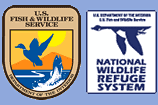 |
Blackwater National Wildlife Refuge
2145 Key Wallace Drive
Cambridge, MD 21613
410-228-2677 TDD/800-735-2258 |
 |
|||||||
|
Global Climate Change & Wetland Loss at Blackwater NWR (11MB PDF)
Given to Society for Wetland Scientists, May 28, 2008
Refuge at Risk
Blackwater National Wildlife Refuge is a refuge at risk. Since the 1930s, over 8,000 acres -- or 12 square miles -- of marsh at Blackwater Refuge has been lost at a rate of 150 acres per year. Causes of this marsh loss include sea level rise, erosion, subsidence, salt water intrusion, and invasive species (such as the recently extirpated nutria).

Value of Blackwater Refuge
Blackwater Refuge is a refuge worth saving because the Blackwater watershed contains one-third of Maryland's tidal wetlands, which makes it an ecologically important area within the state. These wetlands also provide storm protection to southern Dorchester County, including the town of Cambridge. Blackwater Refuge is recognized as a "Wetland of International Importance" by the Ramsar Convention and was named a priority wetland in the North American Waterfowl Management Plan. In addition, Blackwater Refuge has been designated as an Internationally Important Bird Area.
Blackwater is currently home to the largest remaining population of endangered Delmarva fox squirrels and is also home to the largest breeding population of American bald eagles on the East Coast, north of Florida.
The Refuge has been referred to as the "Everglades of the North," and has been called one of the "Last Great Places" by the Nature Conservancy.
Disappearing Blackwater Marsh
(click on thumbnails - photos by Jane Thomas-IAN/UMCES)
 Stressed Marsh (brown) & Healthy Marsh (green) |
 Marsh Being Lost to Open Water |
Saving Blackwater Refuge
Efforts have been ongoing to save the wetlands at Blackwater Refuge, and those actions have included extirpating over 9,000 destructive, non-native nutria; reducing the population of resident Canada geese, which devour newly-planted crops and marsh plants; reducing salt water intrusion; restoring 12 acres of wetlands in the 1980s; and restoring 8 acres of wetlands in 2003. But with the predicted increases in sea level rise, Blackwater Refuge will not survive without a major restoration effort taken on jointly by government agencies, non-governmental organizations and the concerned public.
Blackwater's Comprehensive Conservation Plan calls for restoring the Refuge's wetlands to the same condition as in the 1930s. In order to accomplish this ambitious goal, a Mid-Chesapeake Bay Marshland Restoration Project has been developed by the U.S. Army Corps of Engineers, the Maryland Port Administration, the U.S. Fish and Wildlife Service, the Maryland Department of Natural Resources, and the University of Maryland.
 Dredged material will be available in the future from
the approach channels in the Chesapeake Bay. The Maryland Port Administration must remove 3.5 - 4 million cubic
yards of dredged material each year, and there are three options for putting it to use:
Dredged material will be available in the future from
the approach channels in the Chesapeake Bay. The Maryland Port Administration must remove 3.5 - 4 million cubic
yards of dredged material each year, and there are three options for putting it to use:
- expansion of Poplar Island
- large island restoration in the mid-Chesapeake Bay (Barren Island and James Island)
- and wetland restoration in Dorchester County and Blackwater Refuge
The sediment in these dredging locations is useful for restoring islands and marshlands because the sediment is recent (meaning it's cleaner) and possesses the necessary environmental qualities needed for rebuilding wetland, upland, and submerged aquatic habitat types.
The Dorchester County (Blackwater) restoration is the most technically challenging part of the Mid-Chesapeake Bay Marshland Restoration Project; however it also provides the greatest environmental benefits. Dorchester County restoration would provide dredging material placement for 25-50 years (and perhaps longer) and help Blackwater Refuge reach its goal of returning the property to 1930s-era conditions. Additional future benefits of Blackwater restoration includes prevention of additional wetland loss, restoration of finfish and shellfish fisheries, wildlife protection, storm protection, and increased overall health for the Chesapeake Bay.
More Information
Below are a selection of resources that provide more information on marsh loss at Blackwater Refuge, as well as information on the Mid-Chesapeake Bay Marshland Restoration Project. If you have questions regarding the marsh restoration efforts, please call Dixie Birch, Supervisory Biologist, Blackwater NWR, at Phone: 410-228-2692, ext. 118.
| Windows Media Video - 12MB |
 May 2007: Senator Ben Cardin (D-MD) speaks to attendees of Cambridge, MD meeting regarding wetland restoration project |
PowerPoint Presentations
- Beneficial Use of Clean Dredged Material to Restore Wetlands at Blackwater NWR (13MB PDF) from Oct. 2006, Dixie Birch, Supervisory Biologist, Blackwater NWR
- Restoring Wetlands in the Chesapeake Marshlands NWR Complex (13MB PDF) from Aug. 2007, Dixie Birch, Supervisory Biologist, Blackwater NWR
- Chesapeake Channel Sediments Used for Wetland Restoration (2.4MB PDF), Jeffrey C. Cornwell, UMCES Horn Point Laboratory, Cambridge, MD
- Sea Level Rise and Changing Shorelines (4.5MB PDF), Curt Larsen and Inga Clark, U.S. Geological Survey
- Chesapeake Marshlands: Blackwater NWR and Fishing Bay, Sea Level Response Strategy (1.1MB PDF), Steven Kopecky, U.S. Army Corps of Engineers, Baltimore District
- Carbon Sequestration Associated with Wetland Restoration (686KB PDF), Brian Needelman, Dept. of Environmental Science and Technology, Univ. of Maryland
- Engineering Overview of Marsh Restoration Project, (980KB PDF) Richard Thomas, Gahagan and Bryant Associates Inc.
Newsletter
- Beneficial Use of Dredged Material to Restore Chesapeake Bay Wetlands (4.6MB PDF), February 2007 newsletter from Integration and Application Network
Project Update Handout
- August 2007, Chesapeake Marshlands Restoration Update Handout, (30KB PDF) Dixie Birch, Supervisory Biologist, Blackwater NWR
 Main Menu
Main Menu